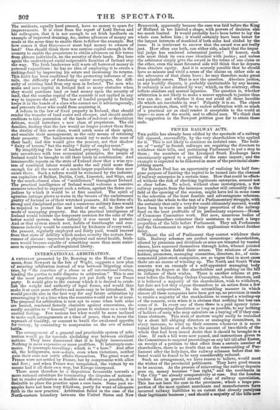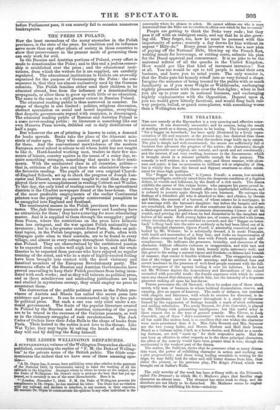FEWER RAILWAY ACTS.
THE public has already been edified by the spectacle of a railway bill opposed, successfully, by the very shareholders who applied for it. This is not likely to continue an isolated case. The hold- ers of " scrip" in Scotch railways are requiring the directors to withdraw their bills, and petitioning Parliament to put a stop to them ; the members of the Liverpool Stock Exchange have unanimously agreed to a petition of the same import; and the example is expected to be followed in more of the provincial share- jobbing marts. Sir Robert Peel has an opportunity of realizing his half fore- gone purpose of limiting the capital to be turned into the channel of railway enterprise in a certain time. How that could be effect- ed without the risk of checking legitimate enterprise, seemed not so clear before. To select, without close investigation, a few railway projects from the immense number still ostensibly in the field at the opening of the session, might have led in some cases to the selection of the least feasible and advantageous schemes. To submit the whole to the test of a Parliamentary struggle, with the certainty that only a very few could ultimately succeed, would have been to waste an unduly large proportion of the railway fund on the least profitable of its preliminary expenses—House of Commons Committee work. But now, numerous bodies of railway subscribers volunteer their assistance to quash a large proportion of the bills before Parliament. They ask Parliament and the Government to reject their applications without further delay.
Without the aid of Parliament they cannot withdraw their bills. Railway schemes are perfect mousetraps : shareholders, allured by premium and dividends as mice are tempted by toasted cheese, have squeezed themselves through holes, whence pointed converging wires forbid their return. The relations of share- holders, promoters, managing committee, directors, &c., of unin- corporated joint-stock companies, are so vague that in most cases there are no means of winding up. The North and South Wales concern was an example of a self-appointed managing hody snapping its fingers at the shareholders and pushing on the bffi in defiance of their wishes. There is another scheme at pre- sent before the Standing Orders Committee, whose directors, and it is believed a majority of the shareholders, wish to withdraw, but dare not lest they expose themselves to an action from a few obstinate scrip-owners. In the scrambling manner in which almost all these companies have been got up, no provision is made to enable a majority of the stockholders to compel a winding-up of the concern, even when it is obvious that nothing but loss can come of it. In every one of them there is a paid agency inter- ested in postponing dissolution as long as possible, to say nothing of holders oiscrip who may calculate on a buying off if they con, tinue obstinate. This state of matters might easily be remedied by a short bill obliging directors or managing committees, in every instance, to wind up their concern whenever it is ascer- tained that holders of shares to the amount of two-thirds of the whole that had been issued desire that it should be brought to a close. If such a bill were now passed, and instructions given to the Committees to suspend proceedings on any bill till after Easter, on receipt of a petition to that effect from a certain number of shareholders, there is no doubt that on the reassembling of Par- liament after the holydays, the railway schemes before that tri- bunal would be found to be very considerably reduced. Such an arrangement, we have reason to believe, would meet the wishes of the provincial petitioners. They have good reason to be anxious. As the process of reinvesting the railway, deposits goes on, money becomes " less tight," and the merchants in "the City" are already comparatively at ease. But the London traders have in general steered clear of railway speculation. This has not been the case in the provinces ; where a large pro- portion of the most opulent merchants and manufacturers have incurred railway liabilities to an extent that already paralyzes their legitimate business ; and should a majority of the bills now
before Parliament pass, it can scarcely fail to occasion numerous bankruptcies.



























 Previous page
Previous page